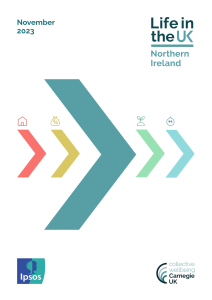- Democracy
- Economy
- Environment
- Evidence and reports
- Inequality
- Measuring wellbeing
- Society
- Jennifer Wallace and Hannah Paylor, Carnegie UK
- 24 November 2023
- ISBN: 978-1-912908-93-6
The Life in the UK index is designed to measure the collective wellbeing of the people of the UK, looking at social, economic, environmental, and democratic aspects of life. This publication outlines Northern Ireland’s scores for collective, social, economic, environmental and democratic wellbeing. The research is based on a representative survey of 6,941 people from across the UK, including 728 from Northern Ireland. It presents key findings in relation to how different demographics are living across Northern Ireland.
- The collective wellbeing score for Northern Ireland in 2023 was 61 out of 100.
- Trust in government and other institutions is much lower in Northern Ireland than elsewhere in the UK, with a majority of people feeling that they cannot influence the Northern Ireland Executive or local level decision makers (74% and 60% respectively).
- People in Northern Ireland are the most likely from across the UK to report that they cannot influence decisions affecting the UK as a whole (84%).
- Disabled people, those who live in social housing or are poorer have lower wellbeing scores.
The Life in the UK index was designed to provide an overall assessment of ‘how life is’. The overall Collective Wellbeing score is an average of the scores for each of the four wellbeing domains: social, economic, environmental and democratic. Higher scores indicate we found a higher level of wellbeing.
The 2023 publication outlines Northern Ireland’s scores for collective, social, economic, environmental and democratic wellbeing. The research is based on a representative survey of 6,941 people from across the UK, including 728 from Northern Ireland.
Overall, Northern Ireland’s collective wellbeing score is in line with that of the UK, at 61 out of a possible 100. The collective wellbeing score is the average of the scores for social, economic, environmental and democratic wellbeing and measures whether we are ‘living well together’. Northern Ireland’s overall collective wellbeing is also in line with other devolved jurisdictions in the UK.
On social wellbeing Northern Ireland scored 72 out of a possible 100. We found that disabled people in Northern Ireland experience lower levels of social wellbeing than non-disabled people (62 compared to 77). We also found that those living in social rented and private rented housing have lower social wellbeing than homeowners (57 and 65 compared to 75 respectively).
On economic wellbeing Northern Ireland scored 69 out of 100. We found a 16-point economic wellbeing gap between disabled people (58) and non-disabled people (74). We also found that as income increases, so too do economic wellbeing scores. The economic wellbeing score for the lowest income group is 55 compared to 83 in the top quintile (a 28-point gap).
On environmental wellbeing Northern Ireland scored 67 out of 100. We found that litter was a particular challenge, with three-quarters of people reporting that there are problems with litter in their area (74%). We also found problems with air quality are experienced by just under two in five people in Northern Ireland (38%).
On democratic wellbeing Northern Ireland scored just 36 out of 100. We found that people from a Catholic community background have lower democratic wellbeing scores than those from Protestant community backgrounds in Northern Ireland (32 compared to 40). We also found in 2023 that people in Northern Ireland are the most likely from across the UK to report that they cannot influence decisions affecting the UK as a whole. And that he majority of people also feel that they cannot influence the Northern Ireland Executive or local level decision makers (74% and 59% respectively).
Our 2023 findings for Northern Ireland indicate the Northern Ireland Executive (not reconvened at the time of publication in 2023) and local councils must act to reduce the wellbeing gaps between socio-economic groups. The Northern Ireland Executive should introduce legislation to protect the wellbeing of future and current generations requiring wellbeing outcomes and indicators to be meaningfully incorporated into priority setting and budgets. Political parties and local councils must invest in fresh and sustained efforts to reverse the sense of alienation from local and national decision-making in Northern Ireland and increase opportunities for meaningful participation.
Help us make the case for wellbeing policy
Keep in touch with Carnegie UK’s research and activities. Learn more about ways to get involved with our work.
"*" indicates required fields
